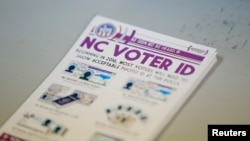The United States Supreme Court has declined a bid by Republican lawmakers in the eastern U.S. state of North Carolina to revive a state law requiring voters to present identification at polling places.
The state's Republican-controlled legislature passed the law in 2013 with advocates saying new measures that also eliminated same-day voter registration and reducing the number of days for early voting were necessary to prevent voter fraud.
But opponents, which include rights groups and Democrats, say those steps unfairly target African-American and Hispanic voters who are less likely to have a photo ID or have easy access to polling places on election day.
An initial federal court decision rejected those concerns, but on appeal the 4th Circuit Court of Appeals said the legislature passed the law "with discriminatory intent."
The 4th Circuit opinion cited research done by the lawmakers before crafting the law, saying they requested data broken down by race on the use of different voting practices.
"Although the new provisions target African Americans with almost surgical precision, they constitute inept remedies for the problems assertedly justifying them and, in fact, impose cures for problems that did not exist," the court said.
North Carolina's then-governor asked the Supreme Court to reverse that decision, but when a new Democratic governor took office in January, he and his attorney general asked the court to dismiss the case. Republican leaders in the legislature subsequently asked that they be allowed to represent the state against those challenging the law.
Supreme Court Chief Justice John Roberts cited the confusion in his two-page notice denying the appeal Monday, and specified that the court declining to hear the case was not a statement on the legal merits.
Governor Roy Cooper welcomed the decision as "good news" for the state.
"We need to be making it easier to vote, not harder," Cooper said. "I will continue to work to protect the right of every legal, registered North Carolinian to participate in our democratic process."
State House Speaker Tim Moore and Senate leader Phil Berger issued a joint statement saying those who want stricter voter ID measures have been "denied their day in court."
"All North Carolinians can rest assured that Republican legislators will continue fighting to protect the integrity of our elections by implementing the commonsense requirement to show a photo ID when we vote," the statement said.
Currently 32 of the 50 U.S. states have a law requiring or requesting voters show some type of identification before they are allowed to vote, according to the National Conference of State Legislatures.
The Supreme Court could be asked to consider another case regarding the issue in the near future, as a legal challenge against a voter ID law in the southern state of Texas moves through the court system.





